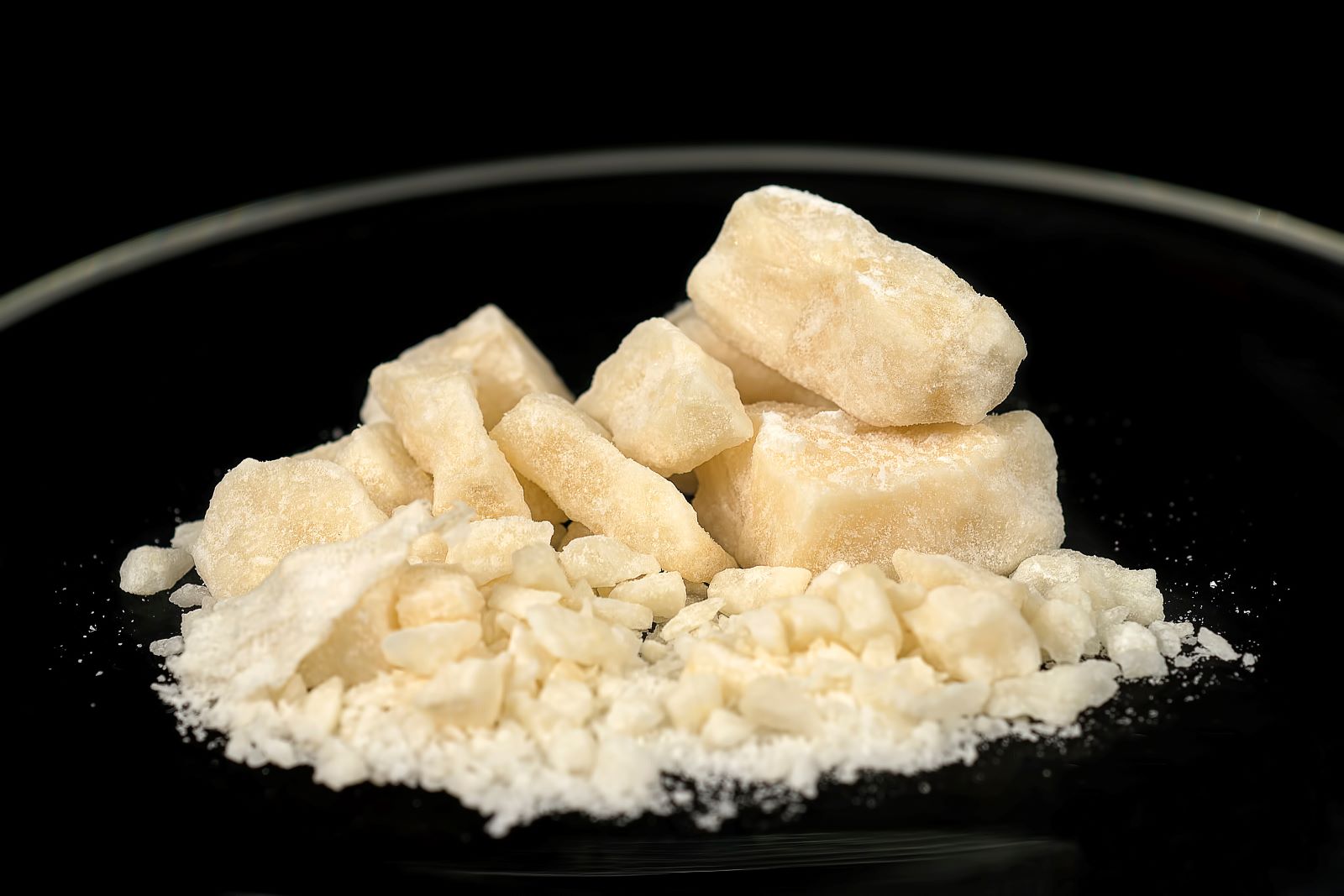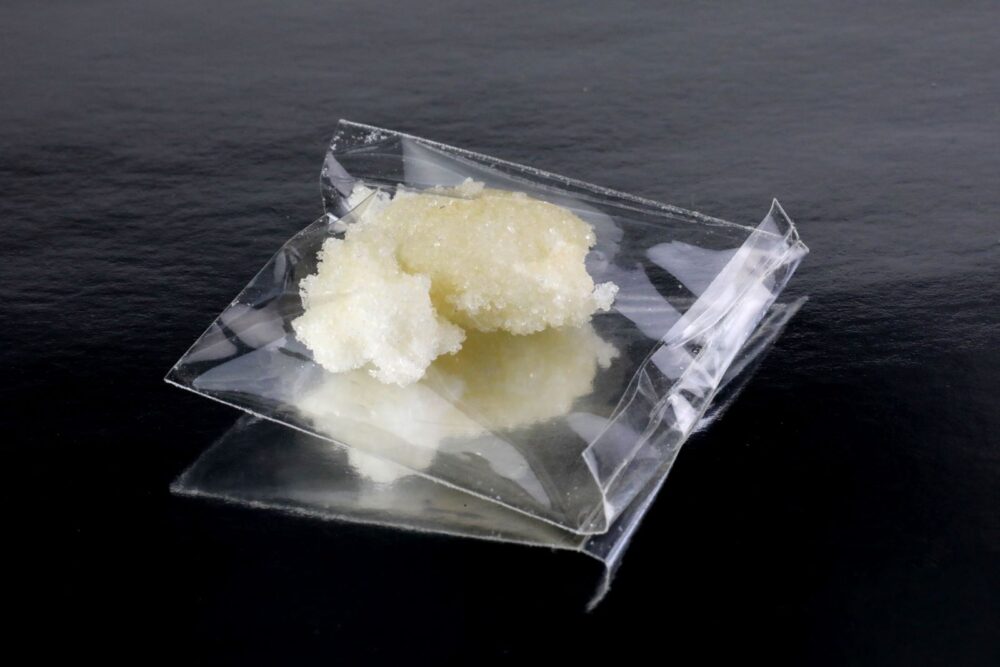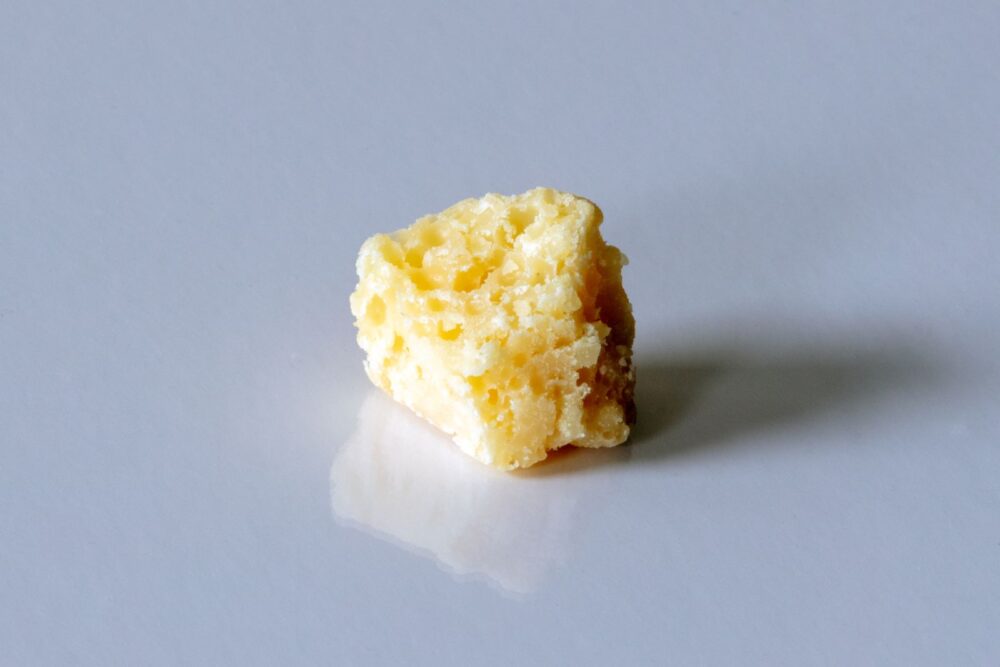Table of Contents
While the list of signs and symptoms of crack addiction is long, not every person who uses this highly addictive drug has the same experience. Common signs of this substance use disorder include respiratory issues, rapid weight loss, withdrawal from friends, family, and everyday activities, and sudden financial issues. Here we’ll discuss what crack cocaine is, the short- and long-term effects of the drug use, and treatment options for yourself or a loved one.
Understanding Crack Cocaine
Cocaine is made from coca plant leaves, a plant found in South America. The leaves have been chewed and ingested for their pain-relieving and stimulating effects. Then, in the late 19th century, cocaine hydrochloride, or the purified chemical, was isolated from the coca plant.[1]
It’s a powerful stimulant drug with similar effects to amphetamine, but it quickly leaves the brain and is almost completely metabolized by the body. Cocaine can be ingested in several forms, such as snorting the white powder, rubbing it into your gums, dissolving the powder and injecting it into a vein, or smoking a small, rock-like piece of cocaine called crack. Crack cocaine causes the most intense high of any form and in the least amount of time after ingesting.
The effects develop because of increased dopamine levels in your brain. In normal conditions, dopamine, a chemical messenger that works between nerve cells, recycles between the cells. Its messages are tied to the reward center, a part of the brain producing a pleasurable feeling. Yet, cocaine overstimulates this area and causes the release of a large amount of dopamine. To recreate this feeling, a person continues to use cocaine in higher amounts as the reward center steadily becomes insensitive to lower amounts.
Dissolved powdered cocaine mixes with water and either ammonia or baking soda to begin creating crack cocaine. The mixture is heated until it boils, and a solid substance forms. The producer then removes the solid, allows it to dry, then breaks it into small pieces or rocks. Crack cocaine earned its name as the substance usually crackles when heated and smoked.
What’s The Difference Between Cocaine and Crack?
Though both are derived from the same coca plant, cocaine is the powder form, while crack is cooked cocaine powder. The main difference is in how both are ingested by a user. Powder cocaine can be snorted, dissolved and injected, or smoked. Crack cocaine can only be smoked.
Either form of cocaine has a long list of street names.
| Cocaine | Crack Cocaine |
| Coke | Black rock |
| Dust | Candy |
| Nose Candy | Gravel |
| Snow | Hail |
| Toot | Jelly beans |
| White Rock | Rocks |
How Is Cocaine Used?
Cocaine is used differently based on its form.
- Snorting: Cocaine powder is inhaled through the nostrils and absorbed through the nasal tissues.
- Oral: Cocaine powder is rubbed directly onto a user’s gums.
- Injection: The powder is dissolved in water and injected into a vein.
- Smoking: When powder cocaine is smoked, it’s called freebase.
Crack Abuse Statistics
- 18-to-1: The ratio of crack cocaine users who are arrested in the United States to powder cocaine users.[2]
- 606,000: People age 26 or older who used crack in the previous month.[3]
- 1 million: People age 26 or older with a cocaine use disorder in the previous year.
Identifying Signs of Substance Abuse Due To Crack Use
Crack cocaine use and addiction don’t have a one-size-fits-all list if you’re trying to identify the signs a friend or family member may have a substance abuse issue. The symptoms are dependent on addiction length, use frequency, and physical dependency. Yet, the range of signs and symptoms include:
- Anxiety
- Chronic runny nose
- Constriction of the blood vessels carrying blood to the heart
- Damaged nasal passages
- Delusions
- Difficulty swallowing
- Dilated pupils
- Diminished or lost sense of smell
- Drug paraphernalia
- Euphoria
- Financial problems, such as suddenly needing money
- Hallucinations
- Hoarseness
- Hypertension
- Increase in risky behaviors, such as engaging in risky sex
- Increase in self-confidence, including feeling superior to others
- Restlessness or increased energy and alertness
- Tachycardia or irregular heartbeat
- Vasoconstriction of blood vessels in the brain
- Withdrawing from friends, family, and/or regular activities
Biological and External Factors That Could Make One More Susceptible To Developing A Crack Addiction
While crack cocaine can be extremely addicting, it alone won’t necessarily cause someone to develop an addiction. Drug use spans all genders, socioeconomic statuses, and geographic locations. More than one factor is usually at play if someone develops a crack addiction.
Environmental
Where and how you live has an impact on potential or existing substance use. Children and teenagers lacking parental involvement or supervision have an environment to try crack cocaine or other illicit drugs.
Genetics
Your genetics are nearly 50% of your risk for substance abuse.[4] Having a parent or family member with any type of addiction raises the chances you, too, may develop an addiction or substance use disorder.
Mental Health
Although a mental health condition can exist with substance abuse, it sometimes occurs before the addiction begins. Some people turn to crack cocaine and other drugs as a means to reduce the symptoms and effects of a mental health condition.
Trauma
People who have a history of traumatic experience(s) sometimes use crack cocaine or other substances to handle the resulting emotions.
Crack Withdrawal Symptoms
How long the withdrawal symptoms last for someone depends on several factors, such as their age, family history of drug use and addiction, medical history, and physical weight. The symptoms occur in three stages: acute, post-acute, and extinction.
Physical Crack Withdrawal Symptoms
The physical symptoms of cocaine withdrawal can be debilitating for some people, heightening the difficulty of breaking their addiction. They include:
- Black phlegm
- Brain seizures
- Bronchitis
- Diarrhea
- Erratic sleeping patterns
- Excessive sweating
- Exhaustion
- Fatigue, lethargy, or sleepiness
- Heart attack
- Hypersexuality
- Increased appetite
- Nausea or vomiting
- Restlessness
- Vivid dreams
Cognitive/Psychological Crack Withdrawal Symptoms
- Aggression or agitation
- Anxiety
- Chronic depression
- Crack cravings
- Cognitive impairment
- Difficulty concentrating
- Disturbing dreams
- Irritability
- Lack of motivation and pleasure
- Mood swings
- Negative moods
- Sense or feeling of paranoia, psychosis, or suspicion
How To Identify A Crack Overdose
The signs of a crack overdose shouldn’t be dismissed or ignored — without medical care and hospitalization, the person may die. Extreme signs of an overdose include a heart attack, seizure, or stroke, but common signs include:
- Chest pain
- Clammy or sweaty skin
- Clumsiness
- Confusion
- Excessive itching or scratching
- Excessive vomiting or dry heaving
- Going in and out of consciousness or coma
- Hyperactivity, including fidgeting or trembling
- Irritability, sometimes with violent behavior
- Marked decrease in respiration (breathing) rate
- Paranoia or abstract thoughts
- Weak blood pressure or pulse
How To Help Someone Who May Be Suffering From A Crack Cocaine Addiction
If you or a loved one suffers from crack cocaine use, there are several addiction treatment options. The first step is detox, a process where you or your loved one cease using the drug. The next step is inpatient care at a treatment facility. During this time, you or your loved one may receive a combination of one-on-one and group counseling as part of the treatment program. Outpatient care helps you or your loved one transition into everyday life with professional support.
Effects of Crack Use
Crack cocaine is highly addictive because of its effect on the pleasure and reward circuit in your brain. The inundation of dopamine in this circuit instead reinforces the need or want for crack cocaine. Because the ensuing high and pleasurable effects wear off quickly, many people don’t stop after the first time of use. Instead, they continue to seek more frequent doses in stronger amounts to feel the same effects. Binges are common when seeking these effects.
Because crack is smoked, it enters your bloodstream quicker than any other ingestion method, enabled by the large surface area of your lungs. The high — some people feel a heightened sense of speed when performing mental and physical tasks — may last up to 10 minutes.
Short-Term Side Effects Of Crack Cocaine Use
Common side effects in the short-term include:
- Dilated pupils
- Hypersensitivity to sight, sound, and touch
- Increased blood pressure
- Increased heart rate
- Intense happiness and energy
- Mental alertness
- Paranoia
The Long-Term Effects Of Crack Cocaine Use
However, the long-term effects of crack cocaine use are more serious and often lead to further medical complications. The effects may include the following:
- Asthma
- Extreme mood swings
- Heart attack
- Intense cough or coughing fits
- Psychosis
- Pneumonia or other lung infection
- Rapid weight loss
- Respiratory distress
Cocaine Abuse and Medical Complications
Cocaine contributes to thousands of deaths annually and is a frequent cause of drug-related deaths.[5] Its vasoconstrictor characteristics — the action of the muscles around blood vessels tightening — cause several life-threatening medical complications, including cardiomyopathies, neuronal destruction, renal failure, respiratory arrest, and sudden death.
Treatment For Crack Addiction
How long you or a loved one need treatment for crack addiction depends on many factors and generally varies from person to person. Many treatment programs offer a holistic approach and also provide help and support for underlying factors, such as mental health. Inpatient and outpatient settings often feature one-on-one counseling with trained professionals and support groups where you or a loved one can find support and understanding from others also seeking help.
FAQs Related To Crack Addiction
What are the physical and mental effects of crack addiction?
Crack addiction causes many physical and mental effects, such as agitation and irritability, delusions, hallucinations, paranoia, and suicidal and violent thinking.[6] It’s also linked to respiratory issues, such as asthma, nasal and sinus damage, pneumonia, and lung damage. Increased heart rates and blood pressure are also common.
What is the chemical in crack cocaine that is addictive?
There isn’t a chemical in crack cocaine itself that makes it addictive. The addiction instead comes from the release of dopamine, a neurotransmitter in your brain responsible for regulating the reward circuit between nerve cells.
Dopamine recycles between the cells, but cocaine blocks the recycling and causes a build-up that releases and overwhelms the circuit. In turn, you experience feelings such as euphoria and pleasure and continue to seek out more to replicate the feeling.
What is the difference between a “crack addict” and a “pot addict”?
A crack addict is someone who has a crack cocaine addiction and continues to use the drug even though it causes numerous health and social issues. A pot addict is someone who regularly uses marijuana, although it causes some or different health and social issues to crack cocaine.
Overcome Crack Addiction In A Safe and Supported Environment
Overcoming a crack cocaine addiction is difficult and sometimes dangerous without the safety and support of a treatment center. Infinite Recovery prides itself on helping people transition back to everyday life through inpatient and outpatient programs. To start the journey to a healthier life for yourself or a loved one, contact us today.
Sources
[1] NIDA. 2022, May 2. What is cocaine? Retrieved from https://nida.nih.gov/publications/research-reports/cocaine/what-cocaine on 2023, January 5
[2] Cleveland Clinic. (n.d.). Dopamine: What it is, Function & Symptoms. Retrieved from https://my.clevelandclinic.org/health/articles/22581-dopamine#:~:text=Dopamine%20is%20a%20type%20of,also%20acts%20as%20a%20hormone on 2023, January 5
[3] Palamar, J. J., Davies, S., Ompad, D. C., Cleland, C. M., & Weitzman, M. 2015, April 1. Powder cocaine and crack use in the United States: An examination of risk for arrest and socioeconomic disparities in use. Retrieved from https://www.ncbi.nlm.nih.gov/pmc/articles/PMC4533860/ on 2023, Janaury 6
[4] NIDA. 2022, December 19. Genetics and epigenetics of addiction drugfacts. Retrieved from https://nida.nih.gov/publications/drugfacts/genetics-epigenetics-addiction on 2023, January 6
[5] Antai-Otong, MS, APRN, BC, FAAN, D. (2006). Medical complications of cocaine addiction: Clinical implications for nursing practice. Retrieved from https://journals.lww.com/jan/Abstract/2006/17040/Medical_Complications_of_Cocaine_Addiction_.5.aspx on 2023, January 6
[6] Morton, W. A. National Library of Medicine. 1999, August. Cocaine and psychiatric symptoms. Retrieved from https://www.ncbi.nlm.nih.gov/pmc/articles/PMC181074/ on 2023, January 6


















